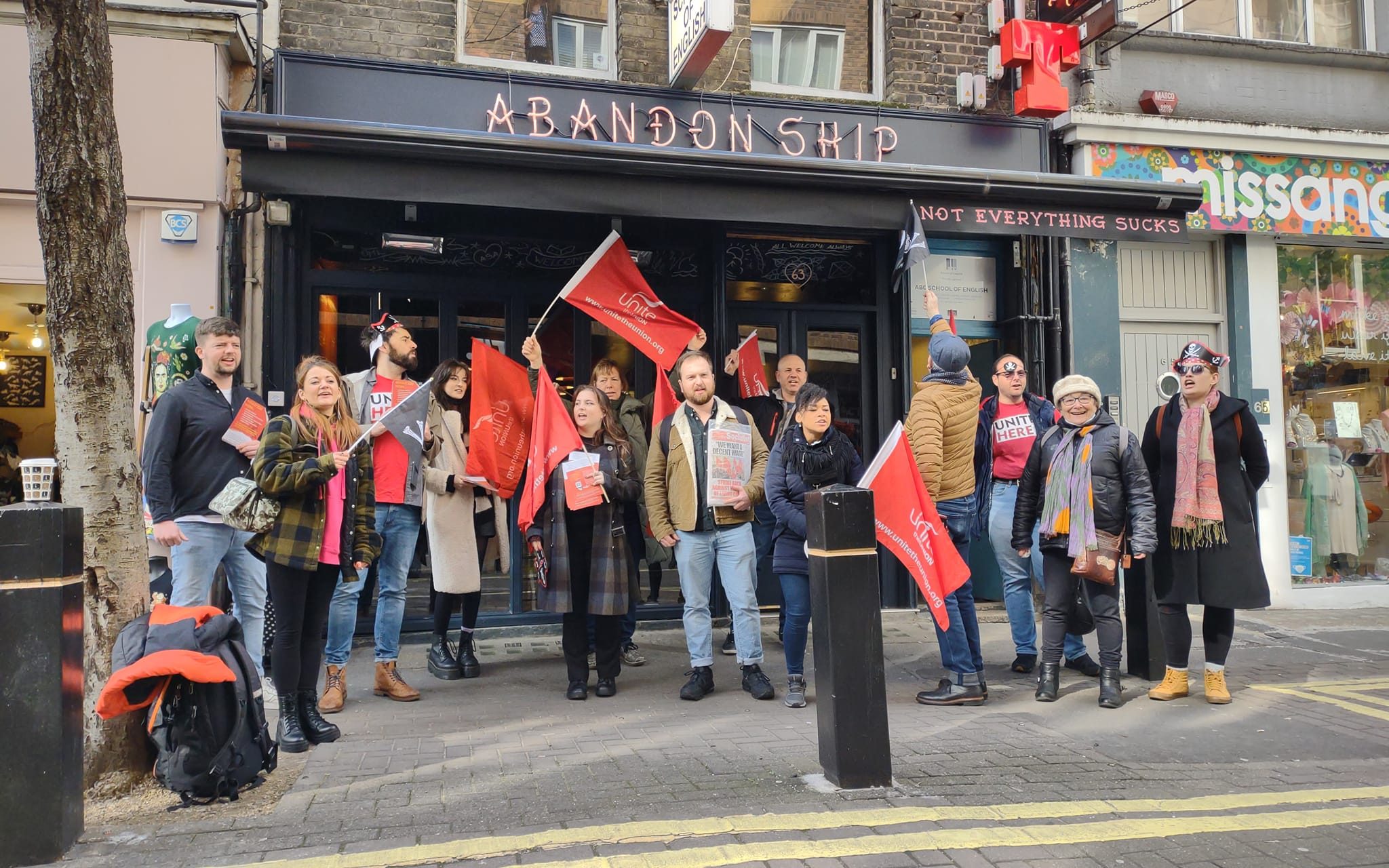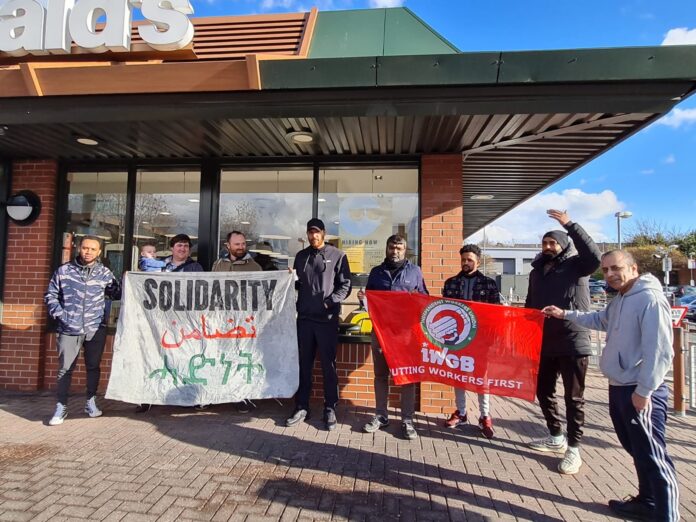The unorganised get organised
Alistair Tice, Sheffield Socialist Party
The cost-of-living crisis, on the back of the pandemic lockdown, has drawn, and will draw, new layers of workers into struggle.
One such layer is gig economy workers, most of whom are classified as ‘independent contractors’, self-employed and freelancers. As such, they have no protection against unfair dismissal, or rights to redundancy pay, the national minimum wage, holiday and sickness pay, and pensions.
Just Eat delivery drivers in Sheffield, working for Stuart Logistics, are currently engaged in the longest gig economy strike in the UK at well over 100 days. They have been taking action since 6 December when their base pay rate was cut by 24%.
The gig economy is where workers are paid for completion of tasks or ‘gigs’, usually accessed online through a website or app, instead of being on a contract paid by the hour. It has expanded massively in the last few years. By the end of this year, 7.25 million workers are expected to work in the gig economy, three times as many as just six years ago. Nearly half of these will have a full-time job as well, so gig work is a second job; but for 30% it is their only or main source of income.
Most familiar are the 3.7 million takeaway food couriers, parcel delivery drivers and taxi drivers. But there are also nearly five million gig workers in online office work, legal, accounting and professional services, domestic and gardening services, and personal services such as hairdressing.
The Sheffield Just Eat couriers strike has been inspiring. 90% of the drivers are from Black, Asian or minority ethnic backgrounds, or migrant workers, often coming from repressive regimes such as Yemen, Somalia and Eritrea.
They are self-employed, so normally in competition with each other to get the best-paid gigs. This means solidarity is not organic to their employment. And they are employed by an app, with no access or communication with any physical boss.
All these factors militate against organising collectively. So for around 100 to join the Independent Workers of Great Britain (IWGB), a small independent union which organises in this sector, and carry out ‘targeted’ strike action for so long, is a huge achievement.
Targeted strike action means the striking drivers picket the outlets of big clients of Just Eat, such as McDonald’s and Greggs, at key times to persuade other couriers not to accept or pick up deliveries on the Just Eat app. This is in order to put financial and bad publicity pressure on Stuart. This type of strike action has allowed the couriers to still work at other times, and even on other platforms, and so earn money, which has helped sustain the dispute over several months.
The strike has been combined with direct action, such as blockades of McDonald’s and KFC drive-throughs, and invasions of Just Eat and Greggs HQs and warehouses. In fact, the Just Eat UK Managing Director has been driven out of Sheffield twice by protests, as has the McDonald’s UK boss!
But Sheffield drivers realised from an early stage in the dispute that Sheffield couldn’t win alone, so acted to spread the strike. So either inspired by Sheffield or arising independently, the strike has spread to around 15-20 other towns and cities over the last six months.
From Chesterfield, West Yorkshire, Sunderland, Teesside, Blackpool and Kent, drivers have taken different forms of strike action at different times, although not usually sustained for a long time.
With the rising cost of living, especially of petrol prices, it is inevitable that there will be more strikes by couriers, especially as Uber and Deliveroo are cutting pay rates as well. In fact, some Uber Eats drivers joined Sheffield’s latest day of action on 17 May, and will be formulating their own demands to join with the Just Eat strike.
The Covid lockdown led to a big growth in gig economy workers. There will be an extra 2.5 million from when the pandemic started by this year end. The sector will probably continue to grow as employers outsource more work to cut labour costs.
But the coming recession will have a big effect. As more workers are made redundant, many are likely to seek work in the gig economy. Increasing competition between workers would drive down earnings further. And recession will likely cut demand for many gig services, as people would have less spending power, due to unemployment and real-term pay and benefit cuts. This makes more disputes and strikes inevitable.
This raises important questions about trade union organisation and demands.
The Supreme Court finally ruled last year that Uber taxi drivers should be legally recognised as ‘Limb (b)’ dependant contractor workers, gaining certain employment protection and rights. On the back of this, the GMB union signed a formal recognition agreement with Uber, which included the national living wage (the Tories’ term for the minimum wage), holiday pay and a pension plan.
Other legal cases, and the beginnings of union organisation and action in the sector, are forcing more companies to introduce ‘worker’ status. But as the minimum wage and workers’ rights are so poor in the UK, it will require bold and innovative union recruitment campaigns linked to organisation and strike action to drive up wages and conditions.
It is of concern then, that the GMB now appear to have signed what the IWGB regards as a voluntary agreement ‘sweetheart’ recognition deal with Deliveroo, undermining the IWGB’s attempts since 2016 to force a statutory recognition agreement. This deal would still leave Deliveroo couriers without holiday or sick pay, and working for less than the minimum wage for their time at work.
All trade unions organising in the gig economy should demand £15-an-hour minimum wage (without exemptions), secure contracts, guaranteed hours, holiday pay, sick pay and union recognition.
Many gig workers do like the flexibility to work around family and in many cases other jobs, so legal recognition as Limb (b) workers would enable those that wanted to, to remain self-employed whilst gaining ‘worker’ status.
One of the demands of the Just Eat strikers has been for a freeze on hiring of new couriers, as more drivers allows the company to drive down earnings. This will become an even bigger issue in recession. Unions, once organised and recognised, must demand trade union control over hire and fire.
One in six adults in the UK currently work a gig job at least once a week. Half are under the age of 35 years old. This is a growing and dynamic section of the economy and a critical one for trade unions and socialists to organise and fight in.
Young hospitality workers fighting back

Elected officer in Unite Bar and Restaurant Workers (personal capacity)
Before the pandemic, workers in the hospitality sector were already facing huge problems. We are one of the most overworked, mistreated and underpaid set of workers. Now, following lockdowns, the sector is facing one of the worst recruitment crises.
The Office for National Statistics reported that between November 2021 and January 2022, empty roles in the sector were at a high of 178,300. This is an increase of 84,000 on that period in the previous year, and a 13.6% increase from the previous quarter.
And it’s only getting worse. I’ve experienced it in my own pub, where we can find staff but we always seem to be one member short. On the one hand, this presents a real problem as the staff that are already overworked will be made to fill the gaps. However, if we are able to organise, it puts us in a very strong position to win demands off the bosses.
This is happening, although still in an embryonic stage. Hospitality workers like myself are organising. The national Unite leaders in our sector are regularly coming together to map priorities for the industry and what is needed to achieve real change. For instance, in London bars and restaurants we’ve highlighted the success of coffee-shop organising in the US, and are looking to replicate that here.
Similar to the industry itself, the activists and lay officials are mostly young workers. Like me, they have only known rampant neo-liberalism – privatisation and deregulation – and extreme austerity, and have been looking for an alternative.
Under the Labour leadership of Jeremy Corbyn, many saw avenues a fightback and got involved in the union to change our industry. Even though Corbyn was defeated in the Labour Party, this mood hasn’t dissipated. Young workers involved in struggle haven’t gone anywhere and Unite Hospitality is a great example of that. We are young workers who see real change is needed for us to live our lives.
That change includes an end to zero hours, £15-an-hour minimum wage without exemptions, safe travel, proper training, consultation on rotas, trade union recognition, and fair tipping policies! But most of all we need socialism!
The experience of casualisation in education
A teacher and NEU member
“Teaching used to be a good job!” That’s what people say, when I describe the conditions of my workplace.
As a teacher of adults, I work in a sector which has been cut to the bone since the Conservative-Lib Dem government of 2010. The result is that contact time between students and teachers is reduced every year, while the number of short courses which are crammed into an academic year increases, in order to meet funding targets. This lack of funding is used as an excuse to cut pay and casualise staff.
There are very few full-time permanent jobs, and staff on temporary contracts are made to compete with each other for permanent jobs which come up. Hourly paid, sessional work is the norm, and staff hired on this basis lose out on holiday pay and sick pay. Casual contracts allow managers to delay offering secure, permanent jobs, and make staff on these contracts feel as though they are constantly ‘on probation’.
Teachers who willingly give up their time, to support students academically and mentally, are often disappointed by the lack of concern from management for their own wellbeing. Money always takes priority. If I had a penny for every time “funding” was mentioned at work, I would be very rich indeed! Perhaps rich enough to compensate for my pay cut of several grand a year.
Zero-hours and casualised contracts are austerity for austerity’s sake. They allow the employer to hold all the cards and further their own agenda at the expense of workers. This is why the Socialist Party stands for an end to insecure working, for the right to full-time work for all who want it, and a ban on zero-hour contracts.







